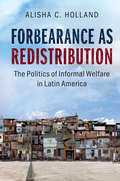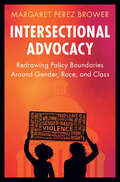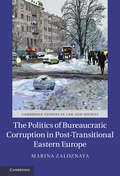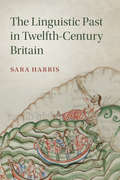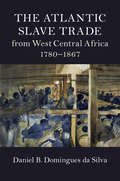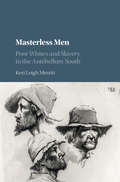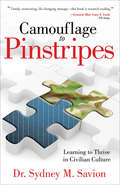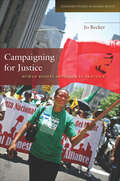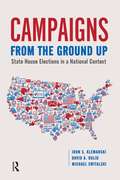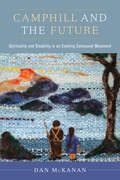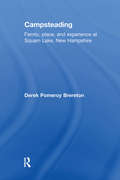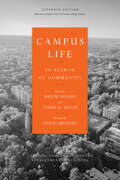- Table View
- List View
Cambridge Studies in Comparative Politics: Forbearance as Redistribution
by Holland Alisha C.Why do governments tolerate the violation of their own laws and regulations? Conventional wisdom is that governments cannot enforce their laws. Forbearance as Redistribution challenges the standard interpretation by showing that politicians choose not to enforce laws to distribute resources and win elections. Alisha Holland demonstrates that this forbearance towards activities such as squatting and street vending is a powerful strategy for attracting the electoral support of poor voters. In many developing countries, state social programs are small or poorly targeted and thus do not offer politicians an effective means to mobilize the poor. In contrast, forbearance constitutes an informal welfare policy around which Holland argues much of urban politics turns. While forbearance offers social support to those failed by their governments, it also perpetuates the same exclusionary welfare policies from which it grows.
Cambridge Studies in Comparative Politics: How Solidarity Works for Welfare
by Prerna SinghWhy are some places in the world characterized by better social service provision and welfare outcomes than others? In a world in which millions of people, particularly in developing countries, continue to lead lives plagued by illiteracy and ill-health, understanding the conditions that promote social welfare is of critical importance to political scientists and policy makers alike. Drawing on a multi-method study, from the late nineteenth century to the present, of the stark variations in educational and health outcomes within a large, federal, multiethnic developing country - India - this book develops an argument for the power of collective identity as an impetus for state prioritization of social welfare. Such an argument not only marks an important break from the dominant negative perceptions of identity politics but also presents a novel theoretical framework to understand welfare provision.
Cambridge Studies in Comparative Politics: The Political Logic of Poverty Relief
by Diaz-Cayeros, Alberto and Estévez, Federico and Magaloni, Beatriz Alberto Diaz-Cayeros Federico Estévez Beatriz MagaloniPoverty relief programs are shaped by politics. The particular design which social programs take is to a large extent determined by the existing institutional constrains and politicians' imperative to win elections. The Political Logic of Poverty Relief places elections and institutional design at the core of poverty alleviation. The authors develop a theory with applications to Mexico about how elections shape social programs aimed at aiding the poor. Would political parties possess incentives to target the poor with transfers aimed at poverty alleviation or would they instead give these to their supporters? Would politicians rely on the distribution of particularistic benefits rather than public goods? The authors assess the welfare effects of social programs in Mexico and whether voters reward politicians for targeted poverty alleviation programs. The book provides a new interpretation of the role of cash transfers and poverty relief assistance in the development of welfare state institutions.
Cambridge Studies in Contentious Politics: Meaningful Resistance
by Erica SimmonsMeaningful Resistance explores the origins and dynamics of resistance to markets through an examination of two social movements that emerged to voice and channel opposition to market reforms. Protests against water privatization in Cochabamba, Bolivia, and rising corn prices in Mexico City, Mexico, offer a lens to analyze the mechanisms by which perceived, market-driven threats to material livelihood can prompt resistance. By exploring connections among marketization, local practices, and political protest, the book shows how the material and the ideational are inextricably linked in resistance to subsistence threats. When people perceive that markets have put subsistence at risk, material and symbolic worlds are both at stake; citizens take to the streets not only to defend their pocketbooks, but also their conceptions of community. The book advances contemporary scholarship by showing how attention to grievances in general, and subsistence resources in particular, can add explanatory leverage to analyses of contentious politics.
Cambridge Studies in Gender and Politics: Redrawing Policy Boundaries Around Gender, Race, And Class (Cambridge Studies In Gender And Politics Ser.)
by Margaret Perez BrowerCambridge Studies in Gender and Politics: Women and Power in Postconflict Africa
by Aili Mari TrippThe book explains an unexpected consequence of the decrease in conflict in Africa after the 1990s. Analysis of cross-national data and in-depth comparisons of case studies of Uganda, Liberia, and Angola show that post-conflict countries have significantly higher rates of women's political representation in legislatures and government compared with countries that have not undergone major conflict. They have also passed more legislative reforms and made more constitutional changes relating to women's rights. The study explains how and why these patterns emerged, tying these outcomes to the conjuncture of the rise of women's movements, changes in international women's rights norms, and, most importantly, gender disruptions that occur during war. This book will help scholars, students, women's rights activists, international donors, policy makers, non-governmental organizations (NGO), and others better understand some of the circumstances that are most conducive to women's rights reform today and why.
Cambridge Studies in International Relations: Economy of Force
by Patricia OwensRetrieving the older but surprisingly neglected language of household governance, Economy of Force offers a radical new account of the historical rise of the social realm and distinctly social theory as modern forms of oikonomikos - the art and science of household rule. The techniques and domestic ideologies of household administration are highly portable and play a remarkably central role in international and imperial relations. In two late-colonial British 'emergencies' in Malaya and Kenya, and US counterinsurgencies in Vietnam, Afghanistan and Iraq, armed social work was the continuation of oikonomia - not politics - by other means. This is a provocative new history of counterinsurgency with major implications for social, political and international theory. Historically rich and theoretically innovative, this book will interest scholars and students across the humanities and social sciences, especially politics and international relations, history of social and political thought, history of war, social theory and sociology.
Cambridge Studies in Law and Society: Security Theology, Surveillance and the Politics of Fear
by Nadera Shalhoub-KevorkianThis examination of Palestinian experiences of life and death within the context of Israeli settler colonialism broadens the analytical horizon to include those who 'keep on existing' and explores how Israeli theologies and ideologies of security, surveillance and fear can obscure violence and power dynamics while perpetuating existing power structures. Drawing from everyday aspects of Palestinian victimization, survival, life and death, and moving between the local and the global, Nadera Shalhoub-Kevorkian introduces and defines her notion of 'Israeli security theology' and the politics of fear within Palestine/Israel. She relies on a feminist analysis, invoking the intimate politics of the everyday and centering the Palestinian body, family life, memory and memorialization, birth and death as critical sites from which to examine the settler colonial state's machineries of surveillance which produce and maintain a political economy of fear that justifies colonial violence.
Cambridge Studies in Law and Society: The Politics of Bureaucratic Corruption in Post-Transitional Eastern Europe
by Marina ZaloznayaUsing a mix of ethnographic, survey, and comparative historical methodologies, this book offers an unprecedented insight into the corruption economies of Ukrainian and Belarusian universities, hospitals, and secondary schools. Its detailed analysis suggests that political turnover in hybrid political regimes has a strong impact on petty economic crime in service-provision bureaucracies. Theoretically, the book rejects the dominant paradigm that attributes corruption to the allegedly ongoing political transition. Instead, it develops a more nuanced approach that appreciates the complexity of corruption economies in non-Western societies, embraces the local meanings and functions of corruption, and recognizes the stability of new post-transitional regimes in Eastern Europe and beyond. This book offers a critical look at the social costs of transparency, develops a blueprint for a 'sociology of corruption', and offers concrete and feasible policy recommendations. It will appeal to scholars across the social sciences, policymakers and a variety of anti-corruption and social justice activists.
Cambridge Studies in Medieval Life and Thought: History, Frankish Identity and the Framing of Western Ethnicity, 550–850
by Helmut ReimitzThis pioneering study explores early medieval Frankish identity as a window into the formation of a distinct Western conception of ethnicity. Focusing on the turbulent and varied history of Frankish identity in Merovingian and Carolingian historiography, it offers a new basis for comparing the history of collective and ethnic identity in the Christian West with other contexts, especially the Islamic and Byzantine worlds. The tremendous political success of the Frankish kingdoms provided the medieval West with fundamental political, religious and social structures, including a change from the Roman perspective on ethnicity as the quality of the 'Other' to the Carolingian perception that a variety of Christian peoples were chosen by God to reign over the former Roman provinces. Interpreting identity as an open ended process, Helmut Reimitz explores the role of Frankish identity in the multiple efforts through which societies tried to find order in the rapidly changing post-Roman world.
Cambridge Studies in Medieval Life and Thought: The Rise and Decline of an Iberian Bourgeoisie
by Jeff Fynn-PaulThe Rise and Decline of an Iberian Bourgeoisie is one of the first long-term studies in English of an Iberian town during the late medieval crisis. Focusing on the Catalonian city of Manresa, Jeff Fynn-Paul expertly integrates Iberian historiography with European narratives to place the city's social, political and economic development within the broader context of late medieval urban decline. Drawing from extensive archival research, including legal and administrative records, royal letters, and a cadastral survey of more than 640 households entitled the 1408 Liber Manifesti, the author surveys the economic strategies of both elites and non-elites to a level previously unknown for any medieval town outside of Tuscany and Ghent. In a major contribution to the series, The Rise and Decline of an Iberian Bourgeoisie reveals how a combination of the Black Death, royal policy, and a new public debt system challenged, and finally undermined urban resilience in Catalonia.
Cambridge Studies in Medieval Literature: Imagining Medieval English
by Tim William MachanImagining Medieval English is concerned with how we think about language, and simply through the process of thinking about it, give substance to an array of phenomena, including grammar, usage, variation, change, regional dialects, sociolects, registers, periodization, and even language itself. Leading scholars in the field explore conventional conceptualisations of medieval English, and consider possible alternatives and their implications for cultural as well as linguistic history. They explore not only the language's structural traits, but also the sociolinguistic and theoretical expectations that frame them and make them real. Spanning the period from 500 to 1500 and drawing on a wide range of examples, the chapters discuss topics such as medieval multilingualism, colloquial medieval English, standard and regional varieties, and the post-medieval reception of Old and Middle English. Together, they argue that what medieval English is, depends, in part, on who's looking at it, how, when and why.
Cambridge Studies in Medieval Literature: The Linguistic Past in Twelfth-Century Britain (Cambridge Studies in Medieval Literature #100)
by Sara HarrisHow was the complex history of Britain's languages understood by twelfth-century authors? This book argues that the social, political and linguistic upheavals that occurred in the wake of the Norman Conquest intensified later interest in the historicity of languages. An atmosphere of enquiry fostered vernacular literature's prestige and led to a newfound sense of how ancient languages could be used to convey historical claims. The vernacular hence became an important site for the construction and memorialisation of dynastic, institutional and ethnic identities. This study demonstrates the breadth of interest in the linguistic past across different social groups and the striking variety of genre used to depict it, including romance, legal translation, history, poetry and hagiography. Through a series of detailed case studies, Sara Harris shows how specific works represent key aspects of the period's imaginative engagement with English, Brittonic, Latin and French language development.
Cambridge Studies in Social Theory, Religion, and Politics: Godless Democrats and Pious Republicans?
by Ryan L. ClaassenDo Evangelical activists control the Republican Party? Do secular activists control the Democratic Party? In Godless Democrats and Pious Republicans?, Ryan Claassen carefully assesses the way campaign activists represent religious and non-religious groups in American political parties dating back to the 1960s. By providing a new theoretical framework for investigating the connections between macro social and political trends, the results challenge a conventional wisdom in which recently mobilized religious and Secular extremists captured the parties and created a God gap. The new approach reveals that very basic social and demographic trends matter far more than previously recognized and that mobilization matters far less. The God gap in voting is real, but it was not created by Christian Right mobilization efforts and a Secular backlash. Where others see culture wars and captured parties, Claassen finds many religious divisions in American politics are artifacts of basic social changes. This very basic insight leads to many profoundly different conclusions about the motivations of religious and non-religious activists and voters.
Cambridge Studies in Social Theory, Religion, and Politics: Politics of Desecularization
by Sadia SaeedThe movement away from secularist practices and toward political Islam is a prominent trend across Muslim polities. Yet this shift remains under-theorized. Why do modern Muslim polities adopt policies that explicitly cater to religious sensibilities? How are these encoded in law and with what effects? Sadia Saeed addresses these questions through examining shifts in Pakistan's official state policies toward the rights of religious minorities, in particular the controversial Ahmadiyya community. Looking closely at the 'Ahmadi question', Saeed develops a framework for conceptualizing and explaining modern desecularization processes that emphasizes the critical role of nation-state formation, political majoritarianism, and struggles between 'secularist' and 'religious' ideologues in evolving political and legal fields. The book demonstrates that desecularization entails instituting new understandings of religion through processes and justifications that are quintessentially modern.
Cambridge Studies on the African Diaspora: The Atlantic Slave Trade from West Central Africa, 1780–1867 (Cambridge Studies on the African Diaspora)
by Domingues Da Silva Daniel B.The Atlantic Slave Trade from West Central Africa, 1780-1867, traces the inland origins of slaves leaving West Central Africa at the peak period of the transatlantic slave trade. Drawing on archival sources from Angola, Brazil, England, and Portugal, Daniel B. Domingues da Silva explores not only the origins of the slaves forced into the trade but also the commodities for which they were exchanged and their methods of enslavement. Further, the book examines the evolution of the trade over time, its organization, the demographic profile of the population transported, the enslavers' motivations to participate in this activity, and the Africans' experience of enslavement and transportation across the Atlantic. Domingues da Silva also offers a detailed 'geography of enslavement', including information on the homelands of the enslaved Africans and their destination in the Americas.
Cambridge Studies on the American South: Poor Whites and Slavery in the Antebellum South (Cambridge Studies on the American South)
by Merritt Keri LeighAnalyzing land policy, labor, and legal history, Keri Leigh Merritt reveals what happens to excess workers when a capitalist system is predicated on slave labor. With the rising global demand for cotton - and thus, slaves - in the 1840s and 1850s, the need for white laborers in the American South was drastically reduced, creating a large underclass who were unemployed or underemployed. These poor whites could not compete - for jobs or living wages - with profitable slave labor. Though impoverished whites were never subjected to the daily violence and degrading humiliations of racial slavery, they did suffer tangible socio-economic consequences as a result of living in a slave society. Merritt examines how these 'masterless' men and women threatened the existing Southern hierarchy and ultimately helped push Southern slaveholders toward secession and civil war.
Cambridge Studies on the American South: Rethinking American Emancipation
by William A. Link Link, William A. Broomall, James J. James J. BroomallOn January 1, 1863, Abraham Lincoln announced the Emancipation Proclamation, an event that soon became a bold statement of presidential power, a dramatic shift in the rationale for fighting the Civil War, and a promise of future freedom for four million enslaved Americans. But the document marked only a beginning; freedom's future was anything but certain. Thereafter, the significance of both the Proclamation and of emancipation assumed new and diverse meanings, as African Americans explored freedom and the nation attempted to rebuild itself. Despite the sweeping power of Lincoln's Proclamation, struggle, rather than freedom, defined emancipation's broader legacy. The nine essays in this volume unpack the long history and varied meanings of the emancipation of American slaves. Together, the contributions argue that 1863 did not mark an end point or a mission accomplished in black freedom; rather, it initiated the beginning of an ongoing, contested process.
Cambridge World Archaeology: The Archaeology of South Asia
by Robin ConinghamThis book offers a critical synthesis of the archaeology of South Asia from the Neolithic period (c. 6500 BCE), when domestication began, to the spread of Buddhism accompanying the Mauryan Emperor Asoka's reign (third century BCE). The authors examine the growth and character of the Indus civilisation, with its town planning, sophisticated drainage systems, vast cities and international trade. They also consider the strong cultural links between the Indus civilisation and the second, later period of South Asian urbanism which began in the first millennium BCE and developed through the early first millennium CE. In addition to examining the evidence for emerging urban complexity, this book gives equal weight to interactions between rural and urban communities across South Asia and considers the critical roles played by rural areas in social and economic development. The authors explore how narratives of continuity and transformation have been formulated in analyses of South Asia's Prehistoric and Early Historic archaeological record.
Camouflage to Pinstripes: Learning to Thrive in Civilian Culture (Camouflage To Pinstripes Ser.)
by Sydney M. SavionThis practical guide offers essential advice for veterans who face mental and emotional challenges as they transition back to civilian life.Leaving the military can be a major life change. In Camouflage to Pinstripes, Dr. Sydney M. Savion examines the psychological process veterans face as they reassimilate to civilian culture. Combining academic research and voices of experience, this book shepherds readers through the process of navigating changes in culture, identity, awareness, and self-renewal.Camouflage to Pinstripes will help individuals make the most of their transition to civilian life by leveraging lessons learned from others. It is about much more than doffing a uniform and donning a suit; it is a gradual journey of surrendering a beloved lifestyle and profession and thriving in a new culture.
Campaigning for Justice: Human Rights Advocacy in Practice (Stanford Studies in Human Rights)
by Jo BeckerAdvocates within the human rights movement have had remarkable success establishing new international laws, securing concrete changes in human rights policies and practices, and transforming the terms of public debate. Yet too often, the strategies these advocates have employed are not broadly shared or known. Campaigning for Justiceaddresses this gap to explain the "how" of the human rights movement. Written from a practitioner's perspective, this book explores the strategies behind some of the most innovative human rights campaigns of recent years. Drawing on interviews with dozens of experienced human rights advocates, the book delves into local, regional, and international efforts to discover how advocates were able to address seemingly intractable abuses and secure concrete advances in human rights. These accounts provide a window into the way that human rights advocates conduct their work, their real-life struggles and challenges, the rich diversity of tools and strategies they employ, and ultimately, their courage and persistence in advancing human rights.
Campaigns from the Ground Up: State House Elections in a National Context
by David A Dulio John S Klemanski Michael SwitalskiBased on data from the most recent elections, this book examines state house races in four key states California, Texas, Michigan, and Virginia and creates simulations of campaign planning, strategizing, budgeting, fundraising, and winning in a variety of political contexts. The authors have not only researched and taught about these issues they have conducted campaigns, run for office, and served in government at every level from the local to the national. They have experience confronting questions of campaign ethics and crisis management, and they actively embrace social media in their work. Internet fundraising as well as campaign websites are among the many media subjects included. This is a book not just for candidates, campaign professionals, and students, but for all concerned citizens who want to understand the pathways of politics better. Features of this Innovative Text: "
Camphill and the Future: Spirituality and Disability in an Evolving Communal Movement
by Dan McKananA free open access ebook is available upon publication. Learn more at www.luminosoa.org. The Camphill movement, one of the world’s largest and most enduring networks of intentional communities, deserves both recognition and study. Founded in Scotland at the beginning of the Second World War, Camphill communities still thrive today, encompassing thousands of people living in more than one hundred twenty schools, villages, and urban neighborhoods on four continents. Camphillers of all abilities share daily work, family life, and festive celebrations with one another and their neighbors. Unlike movements that reject mainstream society, Camphill expressly seeks to be "a seed of social renewal" by evolving along with society to promote the full inclusion and empowerment of persons with disabilities, who comprise nearly half of their residents. In this multifaceted exploration of Camphill, Dan McKanan traces the complexities of the movement’s history, envisions its possible future, and invites ongoing dialogue between the fields of disability studies and communal studies.
Campsteading: Family, Place, and Experience at Squam Lake, New Hampshire
by Derek BreretonThe campstead is an American institution. After the Civil War, with neo-colonialism, environmentalism, and arts-and-crafts on the rise, some families sought rural locations for rustic camps. There they raised their children in the summertime. Around Squam Lake, after some eight generations, twenty-one such camps remain in these families. The Squam area thus becomes a natural place to study relationships of persons and places, families and landscape, and humans and the world. Our present concerns for environmental stewardship, open space protection, and core values instead of consumerism, make this a good time to revisit the simple American Campstead. Rustic camping itself revisited aspects of the American frontier. Just as the western frontier was disappearing, some families resorted to remnants of the first frontier among mountains and lakes of the Northeast. Through campsteads, these families preserved elements of the frontier ethos. Campsteads facilitate particular experiences involving nature and family. Brereton investigates campstead experience, and through it the nature of human experience generally. This book is the first detailed account of campsteading, the first application of critical realism in anthropology, and the first anthropological use of John Dewey's evolutionary model of experience. Building on Dewey, the author further analyses experience into its levels, orders, and features.
Campus Life: In Search of Community—Expanded Edition
by Drew Moser Carnegie Foundation for the Advancement of TeachingIn 1990, under the direction of Ernest Boyer, the Carnegie Foundation for the Advancement of Teaching published a classic report on the loss of a meaningful basis for true community on college campuses—and in the nation. Now this expanded edition of Campus Life: In Search of Community reintroduces educational leaders to the Boyer report's proposals while offering up-to-date analysis and recommendations for Christian campuses today. Editors Drew Moser and Todd C. Ream have assembled pairs of academic and student-development leaders from top Christian colleges to offer a hopeful update on the practical contributions of Christian higher education to the practice of community. This volume includes new chapters, the long out-of-print Boyer report in its entirety, and a discussion guide to facilitate team conversations. Higher education now stands at a critical point, yet the contributors to this expanded edition of Campus Life see current challenges as an opportunity to revive Boyer’s commitment to its formative power. Contributors include: Mark L. Sargent and Edee Schulze of Westmont College Randall Basinger and Kris Hansen-Kieffer of Messiah College Brad Lau and Linda Samek of George Fox University Stephen T. Beers and Edward Ericson III of John Brown University Paul O. Chelsen and Margaret Diddams of Wheaton College Doretha O'Quinn and Tim Young of Vanguard University Christian higher education now stands at a critical point, yet the contributors to this expanded edition of Campus Life see current challenges as an opportunity to revive Boyer's commitment to understanding the formative power of Christian higher education.
